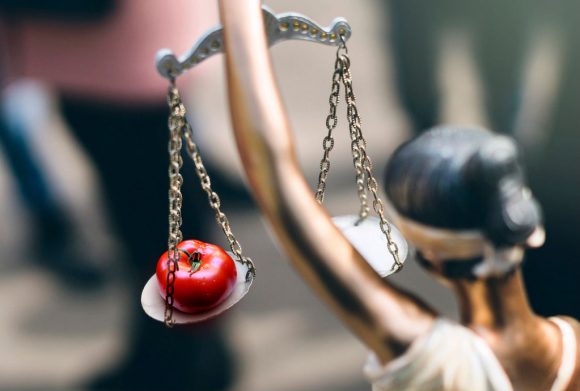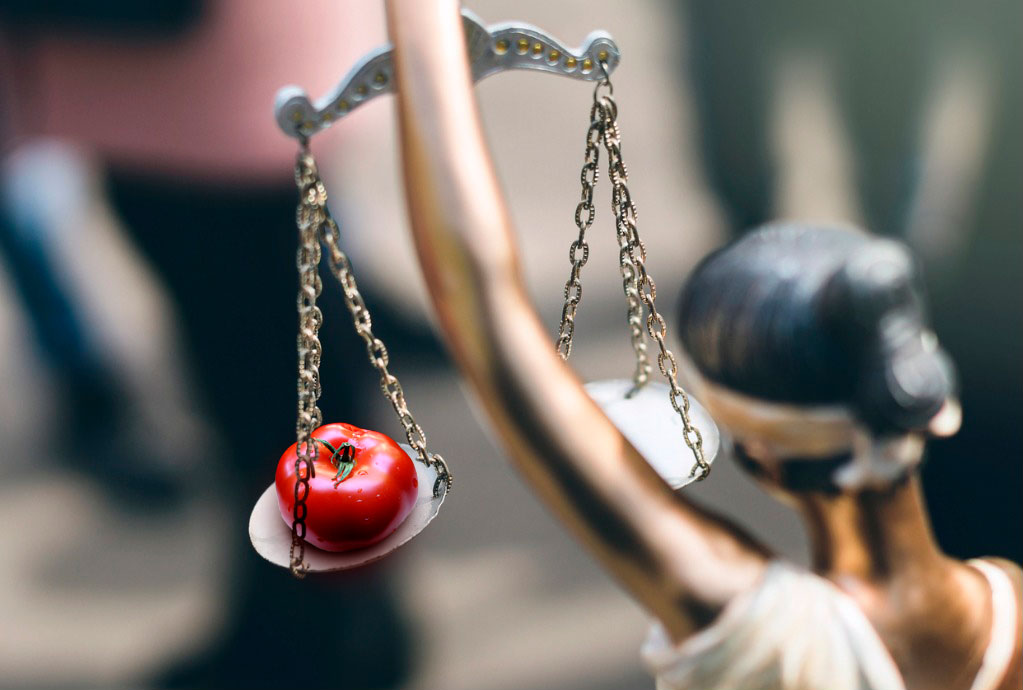The Supreme Court has been asked to opine on many critical issues of its time. These cases have had profound impacts on our society and even the progression of democracy. But perhaps the most important Supreme Court case of all time—at least if you are a hard-core plant geek—was Nix v. Hedden, 1893, in which the Court ruled that the tomato is, for the purposes of taxation, a vegetable.
In the spring of 1886, the Nix family made their living importing tomatoes into New York City from the West Indies. Based on the Tariff Act of 1883, the New York Port tax collector assessed a duty on these imported tomatoes. The Tariff Act required a 10 percent duty on “vegetables in their natural state…” But, the Nix family contended, a tomato is a fruit, botanically speaking, and should not be taxed as a vegetable. The New York tax collector was unmoved by this argument and forced the family to pay the tax, though he did record that the tax was paid under protest.
 People were just as reluctant to pay taxes in 1886 as they are today, and as any good botanist of the nineteenth or twenty-first centuries would tell you, the tomato is indeed a fruit. Its tissues derive from the reproductive organs of the plant (and contain seeds), making it a textbook fruit. It’s not even botanically confusing like the oddball strawberry, which is technically a swollen receptacle that holds fruits (the little black achenes on the strawberry’s surface). A tomato is about as clearly a fruit as there is, botanically speaking.
People were just as reluctant to pay taxes in 1886 as they are today, and as any good botanist of the nineteenth or twenty-first centuries would tell you, the tomato is indeed a fruit. Its tissues derive from the reproductive organs of the plant (and contain seeds), making it a textbook fruit. It’s not even botanically confusing like the oddball strawberry, which is technically a swollen receptacle that holds fruits (the little black achenes on the strawberry’s surface). A tomato is about as clearly a fruit as there is, botanically speaking.
Yet, in common language, we tend to think of fruits as sweet and vegetables as savory. Or perhaps more basically, fruits are for dessert and vegetable go with the main course.
When the tax assessor for the New York Harbor used the common language meaning of tomato as the rationale to levy a tax, in opposition to the botanical definition used by the Nix family, I doubt he knew he was opening a legal can of worms that would end up in the Supreme Court.
The Nix family sued the tax collector. The case was heard by the Circuit Court of the Southern District of New York. The case primarily consisted of entering into testimony the dictionary definitions of fruit and vegetable. The court sided with the tax collector, and the Nixes appealed. Somewhat amazingly, the Supreme Court agreed to hear the case, and registered judgement on May 10, 1893.
By this point, the case was not so much about whether or not a tomato is botanically a fruit. In fact, in his opinion, Justice Horace Gray of Massachusetts freely admitted that “botanically speaking, tomatoes are the fruit of the vine…” But he made a distinction between the common language of the people and the botanical definition. Specifically, he noted that tomatoes are “usually served at dinner in, with, or after the soup, fish, or meats which constitute the principle part of the repast, and not, like fruits generally, as dessert.” He even cited from Supreme Court precedent. In 1889, Robertson v. Salomon, the Court held that, again for tax purposes, white beans (which definitely are seeds) should be taxed as vegetables, and not classified as seeds, which were exempted from taxation. Justice Joseph P. Bradley of New Jersey wrote of white beans, “We do not see why they should be classified as seeds, any more than walnuts should be so classified. Both are seeds, in the language of botany or natural history, but not in commerce nor in common parlance.”
Read more about cultivating tomatoes in our Tomato Talk series on Facebook (#CBGTomatoTalk) and at chicagobotanic.org
The Supreme Court unequivocally stated in Robertson v. Salomon and then reaffirmed in Nix v. Hedden that a technical definition should not necessarily stand in the way of an ordinary or common meaning. According to the high court, tomatoes and white beans are not fruit and seeds, respectively. They can, and should, be taxed as vegetables.
These cases are important to legal history in delineating the differences between technical and common usages of words under legal dispute. But what should a botanist learn from this legal tomato obscurity?
Principally, science and the law are quite different systems. You may conflate them at your own peril. Scientific logic is not always compatible or supported by legal doctrine. Under the law, up can be down, black can be white, and tomatoes aren’t fruits.
And above all, it’s very hard to avoid paying taxes.

Guest blogger Ari Novy, Ph.D., is chief scientist at the Leichtag Foundation in Encinitas, California, and a research collaborator at the National Museum of Natural History in Washington, D.C. He’s interested in pretty much everything about plants, including obscure legal minutiae.
©2017 Chicago Botanic Garden and my.chicagobotanic.org


Wow! That daring to challenge tax on botanical ground. Botany is my favorite. Thanks for sharing interesting article.